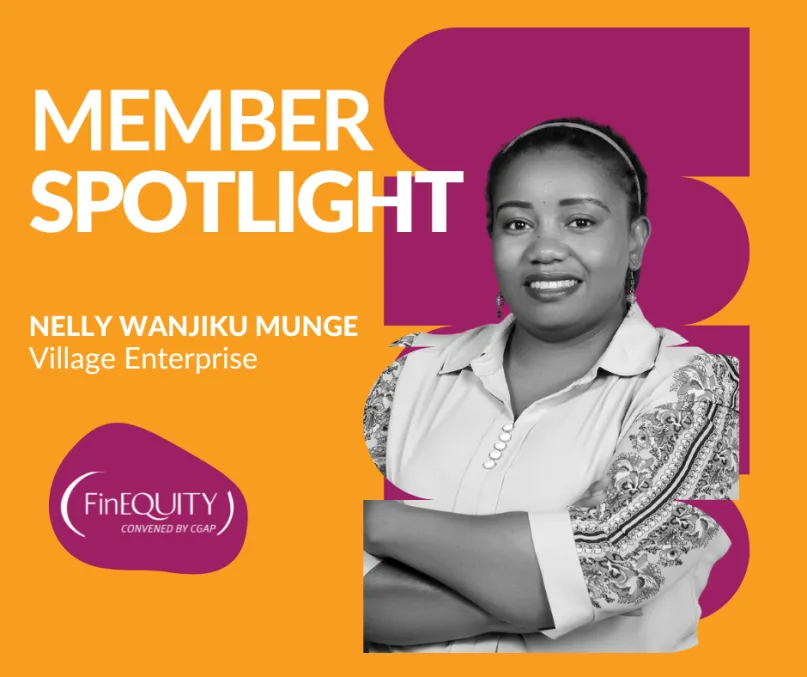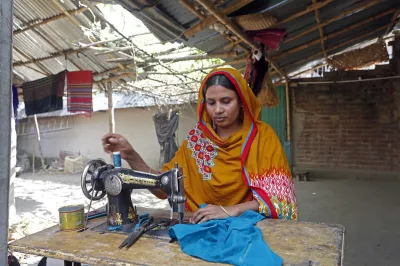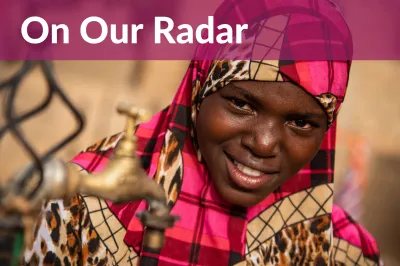Member Spotlight: Nelly Wanjiku Munge

FinEquity Africa: Tell us a little bit about yourself. A fun fact? Something that might surprise most people? Your superpower?
Nelly Wanjiku Munge: l am currently in the wildest time of my life. Last October, I joined the Institute of Development Studies (IDS) in Brighton, UK, to undertake an MA in Gender and Development. I have met incredible women who have fought for gender justice in their countries. I have also discovered that growth comes with immense sacrifice and the need to have a strong support system at work and home.
When I am not occupied with school or work, I love watching National Geography, and currently, I am obsessed with watching Lost Cities, presented by Albert Lin. It is surreal when I think that there are cities that disappeared, especially because of natural disasters. Generally, I like watching documentaries, I enjoy learning new facts and connecting past histories.
FinEquity Africa: What originally drew you to the women’s financial inclusion and economic empowerment sector? What has kept you here?
Nelly Wanjiku Munge: I identify as a feminist. Fighting for justice is an intricate part of me. Growing up, I observed what women experienced and I wanted to do something about it. I also witnessed my mum run successful salons and boutiques while teaching Maths at a public school. She was very strict, worked hard, and always had an income. My mum was open and realistic with me. She told me that as a girl, I needed my own income and to always save for a rainy day. She taught me to pay bills and manage a budget and told me men respect women with their own money. So, I grew up knowing I needed money in my pocket. Watching her, I knew I wanted to be involved in entrepreneurship while having an exciting career. I believe women should have the opportunity to enjoy a successful career and also run a thriving business.
My interest drew me to work for Village Enterprise, an organization that supports women's economic empowerment through entrepreneurship. By equipping women living in extreme poverty in rural Africa with the training, resources, and mentorship to launch sustainable businesses and become entrepreneurs, they are able to increase their income, savings, assets, nutrition, wellbeing, and more. 80% of our participants are women. I enjoy listening to and learning about our participants and the impact they experience. Most of all, I love that Village Enterprises' approach is evidence-based and keen on designing and implementing a human design-centered approach. Every technical activity we do has been lean tested, iterated, and piloted before it is scaled. Village Enterprise intends to do development the right way.
FinEquity Africa: Any current projects you’re working on that you’re finding particularly exciting/engaging?
Nelly Wanjiku Munge: I have personal projects and work projects. I mentioned I went back to school last year. I just submitted two papers, one on an ecological, political perspective on carbon credit programs and another on assessing the level of intersectionality of current gender transformative approaches. I enjoyed the research and the stress that comes with meeting assignment deadlines.
Workwise, I have an exciting year ahead. I am currently working on integrating the Village Enterprise graduation approach with gender and climate change, two of the most urgent issues we must address. Our experience has shown that women do most of the climate adaptation work and they could do even more if they had access to information and tools, as well as gaining agency to adapt to climate change.
Furthermore, we want our ultra-poor graduation methodology to be “norm responsive” and to be liberating empowerment. In this regard, we had to think about how we will measure the impact. So, we joined the Women Economic Co-Lab under FinEquity and we are testing 17 indicators. Our approach tested the economic impact such as increased income, savings, assets, etc, but now we are working towards measuring the non-economic impact, such as increased household decision-making or increased confidence. The results from the Co-Lab will be coming out soon, and I am looking forward to this.
.png)
FinEquity Africa: What have been some of the most impactful findings you’ve come across in your career? What about in the last few years?
Nelly Wanjiku Munge: The most impactful finding is that increased income and savings increases consumption and nutrition, increases household resilience, and creates a pathway out of poverty. At Village Enterprise, our five-year longitudinal study found that even after entrepreneurs graduate from our program, both household consumption and savings continue to rise. On average, our entrepreneurs experienced an 83% increase in consumption and a 933% increase in savings over five years. All of this was achieved despite the shutdowns and economic turmoil of the COVID-19 pandemic, highlighting how our model builds resilience to global shocks. Even with these positive results, we know we need to go even further. For the women we serve, it's not enough if it's not matched with improved agency. Agency is about the ability and space to make choices/decisions. Many practitioners that work to advance women’s economic empowerment struggle with this issue, so allow me to give an example. Some female participants are limited to choosing a particular business because they know they have limited time and resources. Our participants live in societies that are patriarchal, and they need a voice to negotiate and dismantle gender norms that limit their potential. By working to improve women’s agency, as well as equipping them with the tools and resources to own and operate thriving businesses, more women will be able to reach their full potential. This is how we can create systemic change in women’s economic empowerment that will be felt for generations to come.
FinEquity Africa: What are your top priorities for the remainder of 2024 (and beyond) for your work?
Nelly Wanjiku Munge: 2024, will be an interesting year. We hope that by the end of the year, we would have made strides in our approach to become transformative. I think we found a unique way of scaling the gender transformative approach and climate adaptation approach. The current gender work I am doing has three phases. We begin with adding a champion model, then a social behavior change program, then ...I shouldn’t spill the beans. Some of these approaches are at the prototype stage. I can’t wait for the lessons that will come out of this. I am also looking forward to seeing results from the pilot tests we are conducting.
FinEquity Africa: What can our members connect with you about/what can they ask you about?
Nelly Wanjiku Munge: I always wear a gender lens because I am interested in gender and development matters. When I think about gender statistics, the one that always sticks with me is, at our current rate, it will take over a century for the world to achieve gender equality. We simply cannot let that happen! So, let’s connect about building gender equality and women’s economic empowerment. I also speak about the extreme poverty from the lens of the clients I have interacted with. Their tenacity and resilience amaze me and continues to guide the work I do everyday.
FinEquity Africa: What role does FinEquity play in your work? Where do you see value in this community? How has being a member shaped your work?
Nelly Wanjiku Munge: FinEquity is very warm and inviting. I have received many invites to workshops and physical events. It has been a great opportunity for me to network and meet others in my sector. l have learned so much and met different people that wanted to hear my opinion. In 2022, I attended a gender lens design clinic that looked at Incorporating Gender-intelligent Design in Financial Services. We learnt about the need to look at clients using an intersectional lens. Products and services that would apply to a young urban woman entrepreneur will probably not be accessed in the same way by a young rural middle-aged woman. I applied the same exercise in a reflection session at work. I also had the opportunity to meet a few FinEquity facilitators who wanted to profile our work and invited us to give a presentation at the Africa Microfinance Week in Togo last year.


